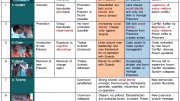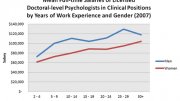 The brain is an amazing thing. Like many amazing things, it is also quite complex. It can process information and data; store and recall information and data; and influence how we behave and feel. All of these tasks are often done simultaneously, or at least within milliseconds of each other.
The brain is an amazing thing. Like many amazing things, it is also quite complex. It can process information and data; store and recall information and data; and influence how we behave and feel. All of these tasks are often done simultaneously, or at least within milliseconds of each other.
Cognitive psychology is meant to help us try to understand the human thought process and how we acquire, process, and store information. Professionals in this branch of psychology study a number of mental processes. A few of the most common - and important - mental processes that cognitive psychologists study include memory, perception, and learning.
Memory is the ability to recall certain bits of information that were acquired in the past. Our memory helps us in learning, speaking, and interaction. Because of this, memory is also one of the most studied areas in cognitive psychology.
Perception is another area of the human mind that cognitive psychologists study frequently. The term perception refers to the way that each of us see the world, and why we have these particular views. Cognitive psychologists that study perception often have a better understanding of predicting future behavior in certain types of people.
The term "cognitive psychology" was coined by Ulric Neisser, an American psychologist working at Cornell University. His book, Cognitive Psychology, was published in 1967, and it remains one of the most influential books in this particular area of psychology.
Why Do We Need Cognitive Psychologists?
In short, the work of cognitive psychologists can help some people overcome their disabilities.
Take memories, for instance. Most of us don't usually think to be thankful for the memories that we have. They're just there. They've always been there. What if you lost your memory? What then? Would you be upset? Would you be upset? Frustrated?
Of course you would! Problems with memories can translate to problems in life in general. As mentioned above, memory affects a number of different cognitive processes. Without a good memory, we would be unable to read, write, or even speak well. It would also be hard for us to remember our friends' birthdays, or even faces.
Through their research, cognitive psychologists have discovered several different ways for a person to improve their memory. This can help with social, language, and learning skills. Learning disabilities, for example, can often be overcome with the help of a cognitive psychologist.
Source: careersinpsychology.org
You might also like:






















clinical Psychologist, Psychology professor, researcher, really any type of psychologist ( ther are many different specialties including experimental, social , school, etc)
Umm....psychology is a very diverse field. When you apply to Ph.D programs, you apply to a specific area like developmental, neuropsych, clinical, social, cognitive, etc. By the time you have a Ph.D., it would mean you are very specialized within one of these subdisciplines. The jobs available to you would differ considerably depending on your training and area focus (and even your primary research topic). The one common job would be as an academic within whatever area you would choose.